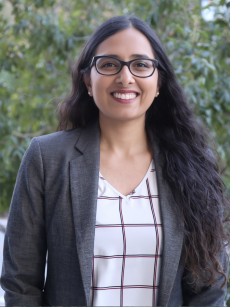
Bhakti Mamtora is a scholar of Hinduism and South Asian Religions in the Department of Religious Studies and Classics at the University of Arizona. Before coming to the University of Arizona, Mamtora taught at The College of Wooster. She holds a Ph.D. in Religion from the University of Florida, and a Masters in South Asian Studies from the University of Pennsylvania.
Her research interests include book history, community formation, digital religion, and migration. Her current book project employs archival, textual, and ethnographic methods to examine the genesis and reception of the Swāmīnī Vāto in the Swaminarayan Sampraday during the nineteenth and twentieth centuries. She has published journal articles in Fieldwork in Religion, Postscripts: The Journal of Sacred Texts, Cultural Histories, and Contemporary Contexts, and The Journal of Vaishnava Studies, and entries in Hinduism in Five Minutes and Brill’s Encyclopedia of Hinduism. Her research and teaching have been supported by the Asian Pacific American Religion Research Initiative (APARRI) and the Wabash Center for Teaching and Learning.
Awards & Fellowships
- Life Worth Living Fellowship (2025)
- Sacred Writes Fellowship (2024)
- Wabash Small Project Grant (2023-2026)
- Asian Pacific American Religion Research Initiative Research Grant (2023-2024)
- Henry Luce III Funds for Distinguished Scholarship (2021, 2019)
- Fulbright-Nehru Fellowship (2017)
Selected Publications
Articles and Chapters
- 2022. "What are the Regional Differences in Hinduism across India?" In Hinduism in Five Minutes edited by Steven Ramey, 53-55.
- 2022. "Can Things be Added to Hindu Texts?" In Hinduism in Five Minutes edited by Steven Ramey, 94-96.
- 2021. “Smartphone Applications and Religious Reading Among Swaminarayan Hindus”. Postscripts: The Journal of Sacred Texts, Cultural Histories, and Contemporary Contexts 12 (1): 21–44. https://doi.org/10.1558/post.20507.
- 2021. "An Inquiry into the Vaiṣṇava Roots of Practices in the Swaminarayan Sampraday." Journal of Vaishnava Studies. 29 (2): 171-180.
- 2020. "At Home Camping on Shifting Sands." Fieldwork in Religion 15 (1-2): 67-80. https://doi.org/10.1558/firn.18352.
Digital Scholarship
- 2022. "Gujarati Bhakti Literature Bibliography." In Bhakti Virtual Archive, edited by Gil Ben-Herut and Jon Keune.
- 2017. "Swaminarayan Sampraday." In The Database of Religious History, edited by Travis Chilcott.

